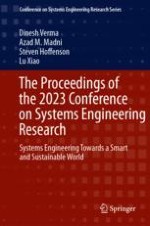2024 | OriginalPaper | Buchkapitel
Using Graph Theory to Investigate the Role of Expertise on Infrastructure Evolution: A Case Study Examining the Game Factorio
verfasst von : Chase A. Covello, Hyunjang Jung, Bryan C. Watson
Erschienen in: The Proceedings of the 2023 Conference on Systems Engineering Research
Verlag: Springer Nature Switzerland
Aktivieren Sie unsere intelligente Suche, um passende Fachinhalte oder Patente zu finden.
Wählen Sie Textabschnitte aus um mit Künstlicher Intelligenz passenden Patente zu finden. powered by
Markieren Sie Textabschnitte, um KI-gestützt weitere passende Inhalte zu finden. powered by
